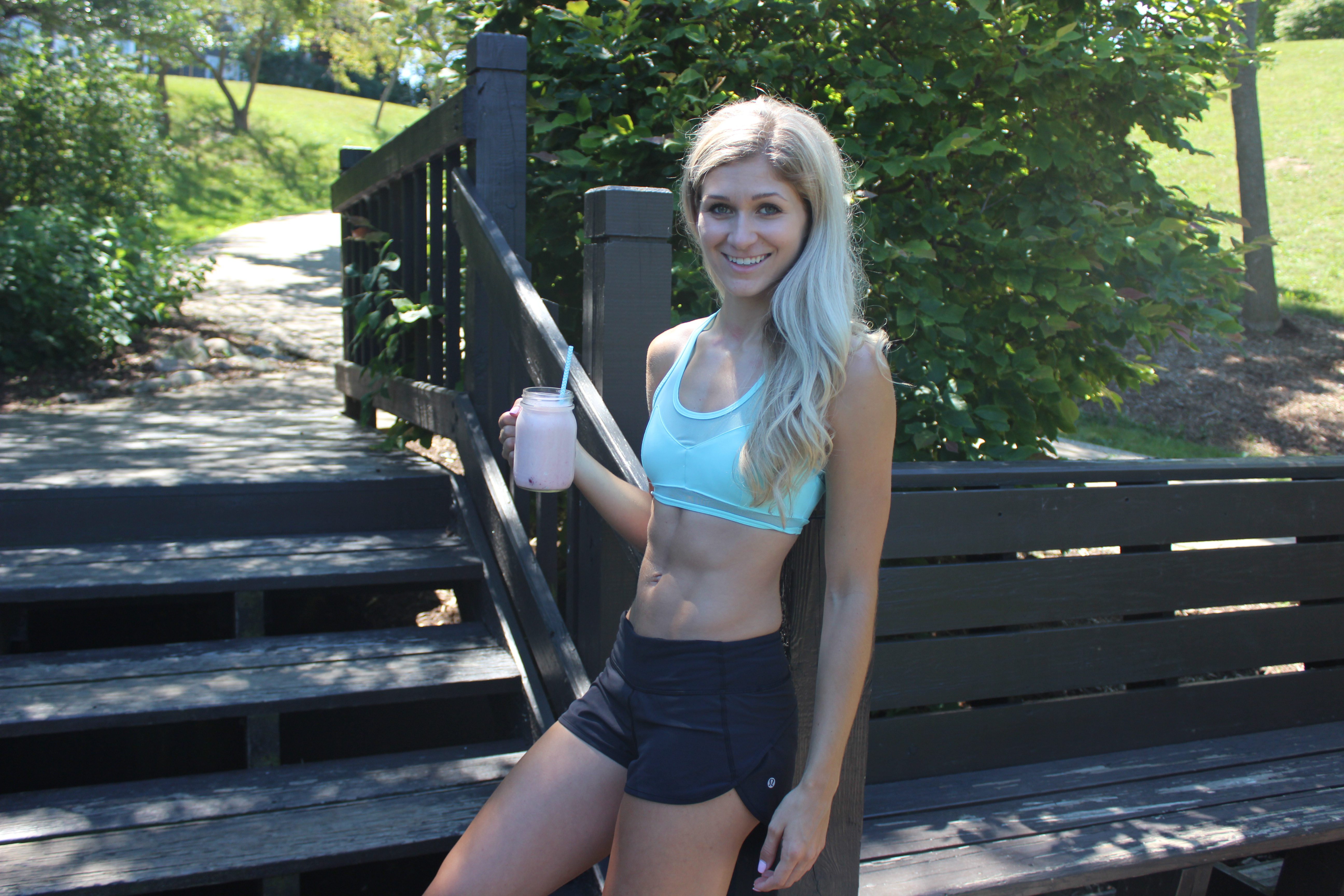Let’s talk supplements, specifically protein! Protein is one of my staple supplements. But, it’s no surprise that choosing the best protein for you isn’t exactly easy. If you’re confused, you’re not alone. Supplements are one of my most requested topics and top questions I receive, so let’s break it down.
First off, this post is just on picking a protein. I have a complete fit girl’s guide to supplements coming later this month where I’ll talk about all supplements- one’s I like/recommend and ones I think are a waste of money. I’ll also include a supplement q+a in that, so be sure to leave any questions you have here in the comments or on my Instagram pic that corresponds with this post.
A general note on supplements… supplements are just that… they supplement an already healthy diet and active lifestyle. They aren’t a magic pill/powder. They each have a helpful purpose, but are by no means necessary. If you’re on a tight budget, I wouldn’t even worry about supplements.
Still, if there is just 1 supplement I would have in my cabinet, it would be a protein powder. I always talk about tailoring your meal plan to your goals: it’s why I created the Eat Your Way Lean Meal Plan. I eat to help me achieve my goals of building muscle while maintaining low boy fat. Eating a higher than average protein amount is important to support that goal for me… muscle synthesis and recover especially. Protein powder makes this easier on me because instead of eating protein through a food source, I can get it in a powder form. It’s quick and convenient.
Let’s get into the 4 things I look for….
Keep in mind, it’s important that my protein powder hits ALL 4 of these items not just 1 or 2

1. PROTEIN SOURCE
This is an important first step when choosing a protein and it’s also a very personalized choice. For example, someone who follows a vegan diet will be in the market for a vegan protein. In general, I personally have 2 requirements, the protein source must be: 1) A Whey Isolate or 2) Plant Based.
A whey isolate protein is different from a whey protein. A whey isolate is a more pure form of whey protein. It contains significantly less lactose than a normal whey protein concentrate, which leads to better digestion and less stomach issues for most people (even if they don’t require a lactose-free diet). You can think of a whey isolate protein as a more refined, higher quality whey protein, which is why it’s a few dollars more than a standard whey protein.
Plant based proteins are just a personal preference. Some women like them because they follow a plant based diet or they feel they digest easier. I actually use a whey protein isolate (even while pregnant – approved by my OB!) and it works really well for me.
2. PROTEIN AMOUNT PER SERVING
This is where a lot of protein powders fall off my list. In my opinion, one scoop of protein should deliver between 20-25 grams of protein. I say this because I incorporate protein powders into meals; I use a scoop in a smoothie. I incorporate protein powder into treats like this and this. I want my protein supplement to deliver a significant source of protein otherwise it doesn’t really support my goals or add any benefit.
There are a lot of protein powders out there that offer between 10-20 grams per scoop, but this would require me to use 2 scoops and therefore cost 2x the amount for 1 serving. When you find a protein like this, they’re usually ones that only have about 15-20 servings per bottle. Now, we are talking about 7-10 total servings (because we have to double up) in one bottle of protein… not the best pick in my opinion!
3. PROTEIN WEIGHT/INGREDIENTS
This is really important! Flip over the tub of protein or look up the nutrition label online. Here’s what we are going to do…
- Look at the amount of protein per serving (let’s say, for example, it’s 24 grams of protein per scoop)
- Now, find the serving size weight aka the weight of the scoop. This is typically found on the top of the label near the serving size. (let’s say our example is 27 grams)
- Compare
The closer the amount of protein per serving is to the overall serving size weight, the more pure the protein is. Just think… those two numbers being close means that what’s contained in your scoop of protein is, in fact, protein!
This is a rough number, but I typically shoot for something like those 2 number being within 5 grams of each other. In our example 27 total grams minus 24 grams of protein leaves 3 grams of “other” which, in my opinion, is pretty good!
What is that “other”- filler! There will be weight from some things like flavoring, but too much means the company is filling it with junk. A technique commonly used to simply fill a bottle of protein with something at a cheaper price.
Also, while you’re looking at the label, take a look at the ingredient list. In general, the fewer ingredients, the better! This is where you can also look at your specific needs.
We all are working with different budgets, but as a general recommendation… you can find several quality proteins that are under $1/scoop. I know many of us have been out of math class for awhile (I giggled the other day when I heard a student talk about “foiling” in algebra class lol)… you can find your cost per serving by taking the total cost of the protein tub divided by the number of servings.
The protein in my pantry is $61 and has 75 servings = $0.81 per serving (plus a few dollars for shipping, but that would still keep it well under $1/scoop. I just add this in because not many people actually look at the price per scoop… we just look at the overall cost.
This is also why I say it’s important your 1 scoop delivers 20-25 grams of protein. Instead of costing $1 per serving, you’re now at $2 per serving if you need to double up. It doesn’t seem like much but $1/day is $365 per year and that could mean 4 pairs of nice sneakers in our closet haha.
Other Helpful Protein Tips:
- Ask the advice of someone you trust not a salesperson; I worked in the supplement field for a few years and unfortunately, I’ve seen too many people push customers to products they make higher commission on instead of a quality product. If you can, get advice from someone who knows their stuff who isn’t working at the store you’re shopping in.
- Shop online for the best prices. This is not at all sponsored, but I find AllStarHealth.com and BodyBuilding.com to have good, competitive prices.
- See marketing for what it is. If you’ve seen a protein powder in all your fitness magazines, it doesn’t mean it’s the best, it may just mean that company is putting a lot into marketing it. Instead, do your own research and feel free to use what I’ve shared to help you make an informed decision.
- Try a few. I like to constantly switch up what protein I’m using because the brands are always switching up their products. Don’t be afraid to try a few before you find the one best for you.
Hopefully now, you feel empowered to make an informed decision. I know it can be annoying that I don’t simply say, “use this protein because it’s the best” or that I don’t share a ton of brands. My philosophy when it comes to health and fitness is to empower you to do what’s best for you. I don’t just want to tell you a certain supplement is good and you should go get it; rather, I want you to know the ins and outs of why ones are good so put you in charge!






It’s true that “they supplement an already healthy diet and active lifestyle. They aren’t a magic pill/powder. They each have a helpful purpose, but are by no means necessary. If you’re on a tight budget, I wouldn’t even worry about supplements”. Very informative post.
I’ve been looking into protein powders since the start of the Confidencekini challenge and the amount of options out there are overwhelming. Thanks for the tips – they are so helpful!
What brand of protein powder do you normally use?
And did you change it since your pregnancy?
So which protein powder do you purchase?
Do you have a few suggestions of which protein powders you really like? TIA! ????
This is incredibly helpful and informational! thank you! I had no idea the difference between whey and whey isolate.
Thank you so much for this post – such helpful information here regarding grams of protein per scoop – sadly something I never thought to investigate! Also, amazon reviews of protein powders are a thing of wonder 🙂